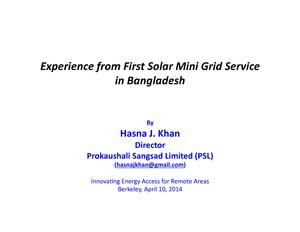Experience from First Solar Mini Grid Service in Bangladesh
From energypedia
The printable version is no longer supported and may have rendering errors. Please update your browser bookmarks and please use the default browser print function instead.
Experience from First Solar Mini Grid Service in Bangladesh
Presenter: Hasna. J. Khan, (Prokaushali Sangsad Limited, Bangladesh)
Rapporteur: Avantika Jalan
Overview
| A 100 kW solar mini-grid service in the remote off-grid rural market of Sandwip island of Bangladesh has shown technical and commercial viability for the service provider. Financial planning of solar mini-grid requires an optimum blend of consumer categories to ensure maximum socio-economic return on investment. Demand and supply side energy management is an important component of stable power supply from the solar mini-grid. Policy-wise, subsidized financing with attractive incentives for the private service providers is essential at this early stage of solar mini-grid deployment[1]. |
Issues Presented
► Please see the presentation.
- Hasna Khan presented the fist solar mini-grid in Bangladesh. It's institutional design is based on the local peoples needs. The presenter believes that solar grids can in future replace diesel generators as there are 8000 markets for this out there.
- In Bangladesh the road network is widely spread but only a small portion (1%) of the rural population is electrified. There is a lot of economic activity – but no power. A lot of demand side management they had to do – to make power available to the market. Restricted use to lights, fridge, fans, and few appliances.
- The solar mini-grids in Sandwip Island (100 kw) are not accessible during some months due to the Himalayan water and other natural disasters.
- The project started with a survey of potential consumers that showed that demands of the user could be met with solar mini-grids.
- SMA from Germany – inverter manufacturers – they collaborated with them. (being 1st mini grid program for Bangladesh).
- The project was paid for with a 50% grant for the project. But kw/h was not sufficient to pay for loan. $723000 US= total cost of project. The costs would be lower now because cost of solar has decreased.
- It took about 3 years before consumers were connected as they had to prove they were reliable
- Learned that energy consumption in November and December is lower demand.
Q & A
1. So far what has been the cost of production?
- ~40 cents, 28 taka which is almost the same amount as the cost /kwh for the consumers.
2. If you were to install the project today, would the costs be lower?
- Yes, since the costs for solar panels overall has come down a lot since the project was installed.
3. Have the batteries been replaced yet?
- Not yet, although we hope is it will last at least for 10 years.
References
- ↑ Experience from First Solar Minigrid Service in Bangladesh. Hasna J. Khan, Asma J. Huque, Kaysar Ahmed Sagor, Tanvir Ahmed, Rashedul Alam, and M. Riazul Hamidi.





















